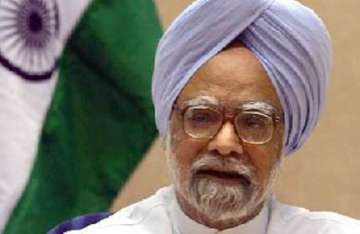Tailor Policies To Control Inflation: PM to RBI
Expressing concern over rising prices, Prime Minister Manmohan Singh on Thursday asked the Reserve Bank of India to formulate policies that control inflation and pave the way for nine per cent-or-more economic growth. Addressing the
Expressing concern over rising prices, Prime Minister Manmohan Singh on Thursday asked the Reserve Bank of India to formulate policies that control inflation and pave the way for nine per cent-or-more economic growth.
Addressing the Platinum Jubilee celebrations of the central bank, he said the monetary and financial policies must ensure that "inflation is kept under control as it hurts the common man the most and also distorts economic signals."
Singh, who himself was RBI Governor in the 1980s, said that the policies should also bring about stability of the banking and financial sectors to avert any financial crisis, besides meeting the financial intermediation of rapid and inclusive growth. The Prime Minister's advice comes about a fortnight before RBI's annual monetary policy, where a major challenge would be to tackle inflation that is nearing double-digits.
Contrary to a period of slower growth witnessed by industrialised countries, India has emerged stronger with a good prospect of better performance on account of high savings and investment rate, he said.
"We must build on these strengths and return as quickly as possible to a high growth path. I believe we can get back to 9 per cent by the end of the Eleventh Plan (2007-2012) and do even better thereafter," he said, adding that the Planning Commission has been directed to explore 10 per cent growth in the next five year plan.
Singh, however, expressed concern over high fiscal deficit, which according to him had increased significantly in the last two years due to steps taken to tackle the global crisis. He said the government was committed to bring it down to 5.5 per cent in the current fiscal and 4.1 per cent by 2012-13 from 6.8 per cent in the year gone by.
"It will be much easier for monetary policy to control inflation if the fiscal targets are met," he said and cautioned that imbalances could lead to rise in interest rate and put pressure on the exchange rate.
"The responsibility for handling this delicate balancing act falls on RBI," he said, adding that there were restrictions on inflows of debt, especially short term debt and the capital account was not entirely open. "Caution in the pace of opening the capital account has been a conscious feature of our policy, and there are good reasons to continue with this approach," Singh said.
He was of the view that financial regulation must avoid excessive risk-taking, while banks should protect their balance sheets from cyclical variations.
Dismissing suggestions for a conservative policy approach, he said: "I sometimes hear that our insulation has served us well and we should therefore avoid experimentation and further liberalisation in this (financial sector). This, I fear, would be a wrong lesson to learn from the crisis."
He complimented the role played by the RBI in tackling the impact of global financial crisis and said that it ensured that the Indian financial system remained stable in these very difficult times. Singh, however, said though the country's financial system needed further development and refinement.
"We must not draw conclusion that financial innovation is not important in our system," he said. In this context he pointed out that Indian banks were not ideally suited to provide long term debt and underscored the need to develop a domestic corporate debt market.
He said: "Our banking and financial system is still relatively small compared to the size of the economy and there are many dimensions in which it must develop to enable it to support the higher rates of growth we are now aiming at."
Advocating further liberalisation in the banking and financial sectors, he said: "Management of foreign currency risks will be an increasingly important concern in future and the financial system must provide our companies with the instrument they need to manage these risks." PTI
